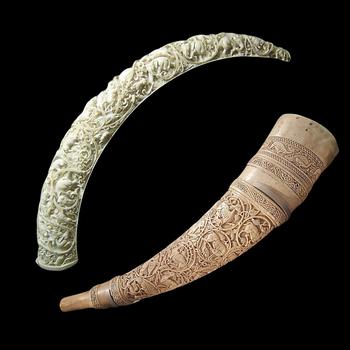featured item
Important update for antique dealers: extension of the Ivory Act 2018
Posted by Chris on 21/02/2025

The Centre for International Trade has shared key updates about the extension of species to the Ivory Act 2018 – one of the toughest bans on ivory sales in the world – which applies to all antique dealers.
The Ivory Act 2018 has been extended to cover four additional species.
The Ivory Act 2018 (Meaning of “Ivory” and Miscellaneous Amendments) Regulations 2025 extend the ban on dealing ivory to the following species: common hippopotamus, killer whale, narwhal and sperm whale.
The regulations came into force on 28 January 2025. It is now illegal to deal in items made of or containing ivory from these species unless they have a valid registration or exemption certificate.
What is banned under the Ivory Act?
The Ivory Act bans dealing in items made of or containing ivory from species listed under the Act.
Dealing means sale, purchase or hire (including keeping an item for any of these purposes), and offering to sell, purchase or hire. The ban applies to dealings taking place within the UK and to exports from and imports into the UK for these purposes.
Which species are covered?
Common hippopotamus, killer whale, narwhal and sperm whale, in addition to elephant.
What are the exemptions?
There are five exemptions to the ivory ban which apply to all species under the ban:?
- musical instruments made before 1975 with less than 20% ivory by volume?
- items made before 3 March 1947 with less than 10% ivory by volume?
- portrait miniatures made before 1918 with a total surface area of no more than 320 square centimetres?
- items a qualifying museum intends to buy or hire?
- items made before 1918 that are of outstandingly high artistic, cultural or historical value.?
Items can be bought, sold or hired out only if they meet one of the five exemptions to the ivory ban. Those items have to be registered or certified under the relevant exemption.
What are the sanctions if you break the law? Are they the same for the new species?
The Ivory Act 2018 is one of the toughest bans on ivory sales in the world. It has some of the strongest enforcement penalties for those found guilty of breaching the ban, with a maximum fine of £250,000 or up to five years prison sentence.
The civil and criminal sanctions remain the same for the ban as it applies to ivory from the four additional species.
For more information on the Ivory Act 2018
Gov.uk guidance on dealing in items containing ivory or made of Ivory





